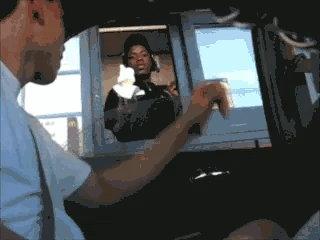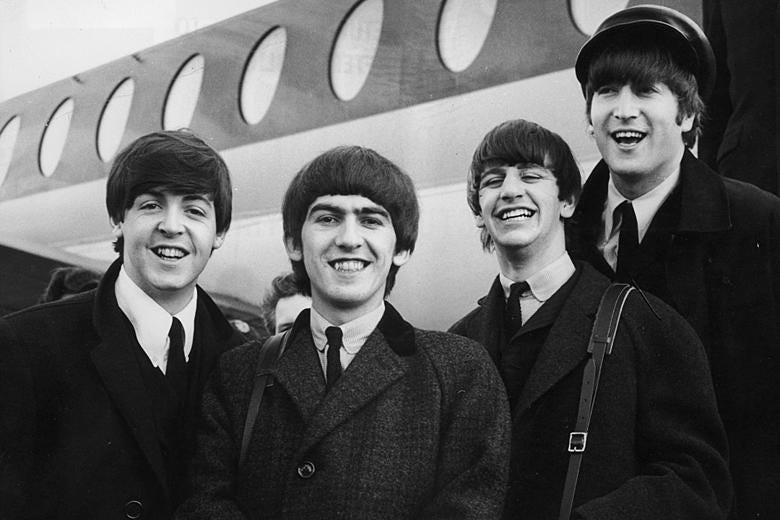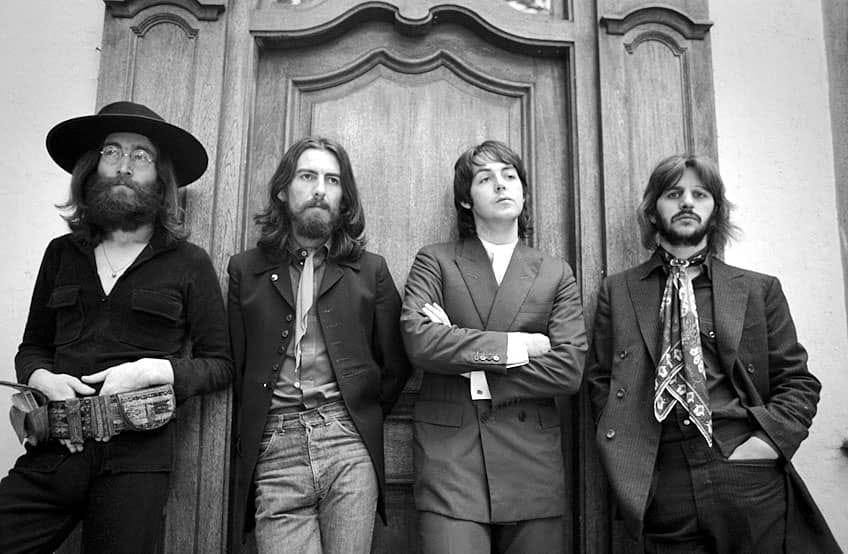If you can’t tell, I’m a big Beatles fan. And in this history of rock series, it’s important to mark the important milestones, like the Day the Music Died.
So let’s pause for a moment to mourn their breakup. There will be time for prog rock, hard rock, punk, and the music of the 1970s.
But first, let’s eat ice cream and sit on the couch:
Like the Day the Music Died, the end of The Beatles is a mic drop. A page turned. It’s the end of the second wave of rock, one bookended by early rock/blues and the psychedelic era. It was the period where rock stars were born, hair grew, and fashion/visuals grew ever important.
Check out the continuity from Buddy Holly and the Crickets (~1957):
To their disciples, The Beatles (1964):
And then the change as The Beatles’ sound developed over only five years:
What happened to their smiles…? (Tbh I’d wear any of those outfits today tho. Fire.)
Well, all was not well in The Beatles’ universe. They were some of the most famous people in the world, but the vibes were off. And on April 10th, 1970, Paul McCartney published a press release announcing the end of the band. Paul released his first solo record (recorded in secret!) only seven days later. Spicy.
To tell the story of The End, let’s touch on two of the last Beatles albums. I picked these two because they’re my favorite and couldn’t be more contrasting.
Brian Epstein, Beatles Manager, Dies of Overdose (1967)
Brian Epstein helped turn The Beatles into global superstars, managing pretty much every aspect of their business. He died at the age of 32.
I knew that we were in trouble then. I didn’t really have any misconceptions about our ability to do anything other than play music. I was scared. I thought, ‘We’ve ******* had it. — John Lennon
The White Album (1968)
One of my favorite records to this day, The White Album is pure chaos. Some describe it as a series of solo albums, featuring the Beatles as a backing band. In many ways, it’s the band’s answer to Sgt. Pepper's Lonely Hearts Club Band. A rebellion against Paul’s control. An exploration of sound and philosophy. The first alternative record?
Just check out the visual comparison between the two records:
Geoff Emerick, the Beatles’ principal engineer, quit during the chaotic sessions. He hated the tension, the animosity, the way the Beatles changed. So he walked out during the recording of "Ob-La-Di, Ob-La-Da.” Life goes on…
Many times, the band members even hit the studio separately. Some say they were burnt out. They’d been recording at a frenetic pace. And had just spent time in India at George’s bequest, studying with Maharishi Mahesh Yogi.
While there, they meditated constantly. The album, in my view, has this tension of men in flux. A yearning but not a finding. A struggle and a conflict, with a dream of salvation never coming.
John, having trouble sleeping after all the meditation, wrote this. I think it reflects what I’m saying about the simmering feelings of the band’s angsty exhaustion after all the frenzy of the previous years:
19 of the 30 songs on The White Album were apparently written during this Transcendental retreat.
Ringo Quits
How mean do you have to be for Ringo to walk out?! Paul picked up the sticks and played drums for the opening track, Back in the USSR. There’s some debate if he played on others, but regardless, the Beatles felt bad, and Ringo returned to the studio with flowers on his drumkit.
Hello, Yoko Ono
John met Yoko, a conceptual artist, on November 7, 1966, at London’s Indica Gallery. Their relationship turned codependent, with Yoko becoming present in most of John’s life. It’s surprising how often this happens in bands. Perhaps it reflects the change from young men prioritizing their friend group to prioritizing their partner. Maybe it’s the need artists have for validation and support. Regardless, the band wasn’t stoked to have Yoko ever-present while they were in the studio. Was Paul jealous? Idk. But it was a vibe shifter.
George Harrison Is Now a Great Songwriter
George was often belittled by the group. His songs were viewed as add-ons or fillers to the great Lennon-McCartney partnership. But the youngest member of the group was really finding his voice, and The White Album (with its expanded tracklist) gave him the room to soar.
While My Guitar Gently Weeps is one of the greatest rock songs ever (with Eric Clapton uncredited as the soloist), but I'd like to showcase a sleeper. A truly haunting song. Like something an Ent from Lord of the Rings might sing:
That’s a songwriter that’s onto something. (Pun intended…)
Revolution, Revolution and Revolution NUMBER NINE
The three versions of John’s song, Revolution, tell the tale of the album.
Here’s the version that made the album. It’s more in-line with John’s original vision:
I don’t know why but the record skip at 3:25 has influenced me as much as anything. It’s just so surprising and satisfying. It never fails to grab my ear.
The first take of ‘Revolution’ – well, George and Paul were resentful and said it wasn’t fast enough. Now, if you go into the details of what a hit record is and isn’t, maybe. But The Beatles could have afforded to put out the slow, understandable version of Revolution as a single, whether it was a gold record or a wooden record. But because they were so upset over the Yoko thing and the fact that I was becoming as creative and dominating as I had been in the early days, after lying fallow for a couple of years, it upset the applecart. I was awake again and they weren’t used to it. — John Lennon
Here’s the single version, changed at George and Paul’s request. Check out how the guitar rips through the speakers:
The Beatles jammed on Revolution quite a bit, recording 20+ takes. Here’s an 11-minute version if you have the time.
John invited George, Ringo, and Yoko to chop up that audio (not you, Paul), and made an 8-minute version of a “sound collage” called Revolution 9. It used the tape looping effects the band helped pioneer in pop music on Tomorrow Never Knows.
Consider the transformation of the Beatles image, then consider their early music compared to this:
Is that rock? What is rock now? An attitude?
Happiness
“Happiness is a Warm Gun” is my favorite example of what made The White Album so great. Chaotic, complex, moving. It’s a work of art-rock.
Hear the use of audio effects and the mix of folk and psychedelic influences in the songwriting? Hear the guitar tones? Modern artists like Tame Impala (and me…) are still referencing these. Hear the rock/doo-wop genres?
As we move on from The White Album, consider the tragic passing of Brian Epstein. Do you think that impacted the band’s ability to coalesce? Maybe instead of thinking of The White Album as a chaotic part of the band’s end, we could think of it as a record of mourning, written primarily on retreat together but apart in India.
An LP about death and change and growth. The chaos of life and endings. A sadness of the inevitability of change. But an overturning of expectation. A beginning of codependency and division all at once.
Abbey Road (1969)
While it’s a matter of debate if Abbey Road is the last Beatles record, it thematically fits as an end.
George Martin, The Beatles’ longtime producer and father figure, only agreed to return if the band worked "like they used to." Geoff Emerick, also their longtime engineer, returned. And after recording in several studios for The White Album, The Beatles returned to the studio that started it all: EMI Studios on Abbey Road.
Come Together
The lead-off track showcases John’s evolving lyrical style, poetic and nonsensical all at once, alongside a remarkably tight rhythm section and one of the greatest bass riffs of all time by Paul:
I Want You (She’s So Heavy)
Another John song, the raw emotion and hard-hitting nature of the song contrasts with the swampier and more chill, Come Together. There are only fourteen words in almost eight minutes. This song also featured white noise from a Moog synthesizer, an innovation that we’ll dig into more next week.
Something
One of the best love songs of all time, George Harrison’s Something shows just how developed and next-level his writing had become.
Here Comes the Sun
I’ll let George take it away for this one:
"Here Comes the Sun" was written at the time when Apple was getting like school, where we had to go and be businessmen: 'Sign this' and 'sign that.' Anyway, it seems as if winter in England goes on forever, by the time spring comes you really deserve it. So one day I decided I was going to sag off Apple and I went over to Eric Clapton's house. The relief of not having to go see all those dopey accountants was wonderful, and I walked around the garden with one of Eric's acoustic guitars and wrote "Here Comes the Sun". — George Harrison
The End
A medley. A bow. A masterpiece.
Paul McCartney, the primary writer, wanted to make it so. The guitar solos go from Paul McCartney, George Harrison, and John Lennon, in order.
Let’s end this post the same way The Beatles did.
And in the end, the love you take is equal to the love you make.
And and if you want want (repetition can be fun fun) a breakdown of how The Beatles’ approach to songwriting illustrates the way an artful balance of structure and creativity can launch a song above above the realm of craft, listen to this throwback episode from when the pod was just getting off the ground where I dig into a couple from their catalog. PSA: listen on the Spotify app to hear the tracks:
Did you know I just dropped my first full length vinyl?! We're all super into how it came out and hope you are too! You can browse the options and pick up a variant at this online shop. It would mean so much to me and the team if you b🎨ught a c🎨py 🎨
Thanks for reading, internet friends,
Scoob










The Beatles band dismantlement showed how important they were to people and how this was a huge shift in rock. I found it interesting how the the white album reflected the bands internal struggles.
I feel the part with yoko stood out to me most. It kind of shows that at some parts of one's life should never interfere with others. When listening to Ob-la-di, ob-la-da. It kind of reminded me of the situation. I'm definitely reaching far to make a connection like this but I think desmond and molly kind of tie into the yoko and john situation. Molly in the song finds desmond and has a family but still plays in the band. It's an entirely different part of her life. Maybe that's what they wanted John to do. That's just surface info i'm going off of though, I could be totally wrong. It's fun to theorize though.